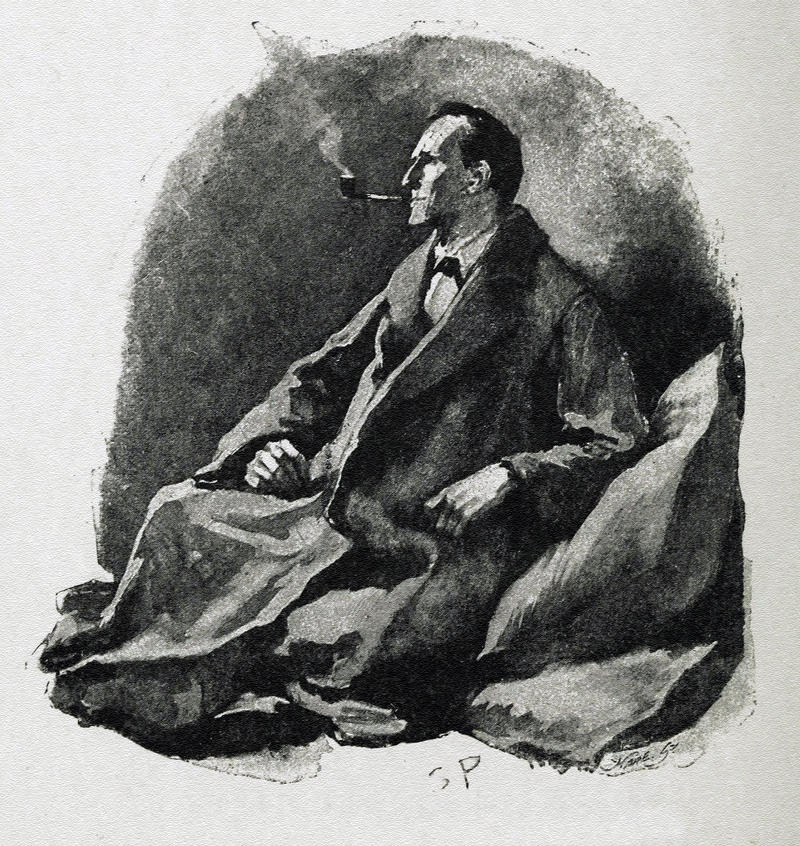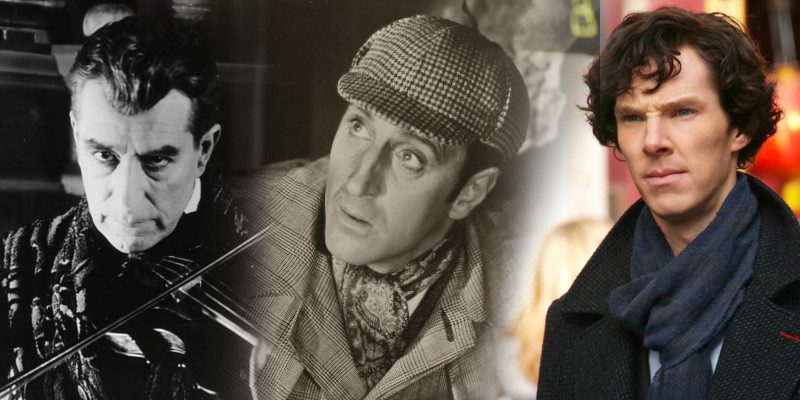The Guinness Book of World Records lists Sherlock Holmes as the “most portrayed literary human character in film and TV”.
Claire Burgess, an adjudicator for Guinness World Records, said,

Created in 1887 by Scottish author Sir Arthur Conan Doyle, Sherlock Holmes has been played by over 75 actors—besting even William Shakespeare’s Hamlet.
Which begs the question “who was the best?”
If we could ask Sir Arthur Conan Doyle that question, he would have said, Eille Norwood:
“He has that rare quality, which can only be described as glamour, which compels you to watch an actor eagerly even when he is doing nothing. He has the brooding eye which excites expectation and he has also a quite unrivaled power of disguise.”
Sir Arthur said those words in the early 1920’s and there have been some truly remarkable performances since.
You will probably have your favorites in mind already, but just to help, we’ve shortlisted eight of the best Holmes of all time—each actor critically acclaimed as Sherlock for their era.
Eille Norwood (1923)
Sir Arthur Conan Doyle himself admired Norwood’s portrayal, saying: “His wonderful impersonation of Holmes has amazed me.”
Norwood was obsessed with portraying Holmes true to the written stories.
He re-read all the stories published up to that time and even learned to play the violin.
Norwood had a reputation as a very professional actor with an incredible ability with make-up and disguise.
In this 2-minute clip, you get a sense of what it was like to watch a movie without sound.
It may seem ridiculous to us today, but in 1923, moving pictures, even without sound, were still a novelty for most people.
There is a story that asked to do an impromptu screen test, Norwood excused himself to the dressing room and appeared a few minutes later “an entirely new person”.
He had done very little in the way of make-up, and he had no accessories, but the transformation was remarkable – it was Sherlock Holmes who came in that door.
Arthur Wontner (1935)
Allmovie wrote that Leslie S. Hiscott’s 1931 movie “Sherlock Holmes’ Fatal Hour” got the Wontner Holmes series off to a rousing start.”
We’ve moved forward into the era of “talkies”, or “talking pictures”, and it’s easy to see how much more watchable this movie is than the 1923 version.
In the United States, “talkies” helped secure Hollywood’s position as one of the world’s most powerful cultural/commercial centers of influence.
In Europe, they were viewed with some suspicion, where critics feared that a focus on dialogue would subvert the unique aesthetic virtues of soundless cinema.
The New York Times wrote of Wontner in Leslie S. Hiscott’s 1935 film “The Triumph of Sherlock Holmes”, “a mellow, evenly paced British film that renders to Holmes what Sir Arthur Conan Doyle would have rendered to him: Interest, respect. and affection … Mr. Wontner decorates a calabash pipe with commendable skill, contributing a splendid portrait of fiction’s first detective.”
“The Sign of Four” 1932 Film.
“The Missing Rembrandt” 1932 Film.
“The Sleeping Cardinal” 1931 Film.
Basil Rathbone (1939)
Basil Rathbone is credited with creating the definitive screen interpretation of Sherlock Holmes, his only rival generally conceded to be Jeremy Brett’s interpretation of the fictional detective.
His expert fencing skills earned him a reputation as the greatest swordsman in Hollywood history.
“Sherlock Holmes” by Ouida Rathbone 1953 Stage Play.
“Dressed to Kill” 1946 Film.
“Terror by Night” 1946 Film.
“The House of Fear” 1945 Film.
“Pursuit to Algiers” 1945 Film.
“The Woman in Green” 1945 Film.
“The Pearl of Death” 1944 Film.
“The Scarlet Claw” 1944 Film.
“The Spider Woman” 1944 Film.
“Sherlock Holmes in Washington” 1943 Film.
“Sherlock Holmes and the Secret Weapon” 1943 Film.
“Sherlock Holmes Faces Death” 1943 Film.
“Sherlock Holmes and the Voice of Terror” 1942 Film.
“The New Adventures of Sherlock Holmes” 1939-1946 Radio (Blue Network & Mutual).
“The Adventures of Sherlock Holmes” 1939 Film.
“The Hound of the Baskervilles” 1939 Film.
Peter Cushing (1959)
Peter Cushing as Sherlock Holmes played alongside long-time fellow Hammer Films actor Sir Christopher Lee in a highly acclaimed production of Hound of the Baskervilles.
Hammer Films was famous in the UK for its gothic horror films from the mid-1950s to the 1970s.
Time Out called it “the best Sherlock Holmes film ever made, and one of Hammer’s finest movies”.
But Peter Cushing’s Holmes received mixed reviews, with Films and Filming calling him an “impish, waspish, Wilde-ian Holmes”, whereas The New York Herald Tribune stated, “Peter Cushing is a forceful and eager Sherlock Holmes”.
Cushing also played Holmes in a BBC TV Series in 1968.
Jeremy Brett (1984)
Inheriting the mantle from the great Basil Rathbone was a tall order indeed, but Jeremy Brett pulls it off with a long-running TV series in the 80’s and again in the 90’s.
Considered to be the definitive Holmes of his era, Brett once said that “Holmes is the hardest part I have ever played — harder than Hamlet or Macbeth.”
“The Memoirs of Sherlock Holmes” 1994 TV series.
“The Casebook of Sherlock Holmes” 1991–1993 TV series.
“The Secret of Sherlock Holmes 1988–89” Stage (touring, British).
“The Return of Sherlock Holmes 1986–1988” TV series.
“The Adventures of Sherlock Holmes” 1984–1985 TV series.
41 episodes.
Rupert Everett (2004)
Sherlock Holmes and the Case of the Silk Stocking is a British television film originally broadcast on BBC One in the UK on 26 December 2004 and PBS’s Masterpiece Theatre in 2005.
Holmes used cocaine, which he injected in a seven-percent solution with a syringe and also dabbled in morphine, both of which were legal in late-19th-century England.
This adaptation with music from Johnny Cash highlights Holme’s drug use in the movie.
Reviews of the drama were generally mixed.
Robert Bianco of USA Today remarked,
Brian Lowry of Variety wrote, “The Case of the Silk Stocking is a rather wan addition to the Holmes filmography, yet respectable enough in showcasing the character’s cerebral charms. If push comes to shove, though, when all the revisionism’s done, I prefer my Holmes in black-and-white.”
Robert Downey Jr (2009)
Robert Downey Jr reminded us that in addition to a suave and sophisticated Victorian gentleman, Sherlock Holmes is also, “a brawling, head-butting, fist-in-the-gut, knee-in-the-groin action hero.”
In addition to brawn, Downey brings his “characteristic twitchy wit and haggard insouciance, he has more intelligence than the movie knows what to do with.”
The London scene is given a makeover with “a smoky, greasy, steam-punk rendering of Victorian London, full of soot and guts and bad teeth and period clothes — shows some undeniable flair.”
Ref: NYTimes “Sherlock Holmes” 2009 Review.
“Sherlock Holmes” 2009 Film.
“Sherlock Holmes: A Game of Shadows” 2011 Film.
Benedict Cumberbatch (2012)
Danny Bowes, writing for Indiewire thinks the greatest performance as Sherlock Holmes is that of Benedict Cumberbatch.
“Sherlock” 2010–present TV series (BBC).
15 episodes.
Several other actors have played Sherlock Holmes to varying degrees of success, including Roger Moore, John Cleese, Tom Baker (of Dr Who fame), Christopher Lee, Peter Cook, Ian Richardson (House of Cards).

